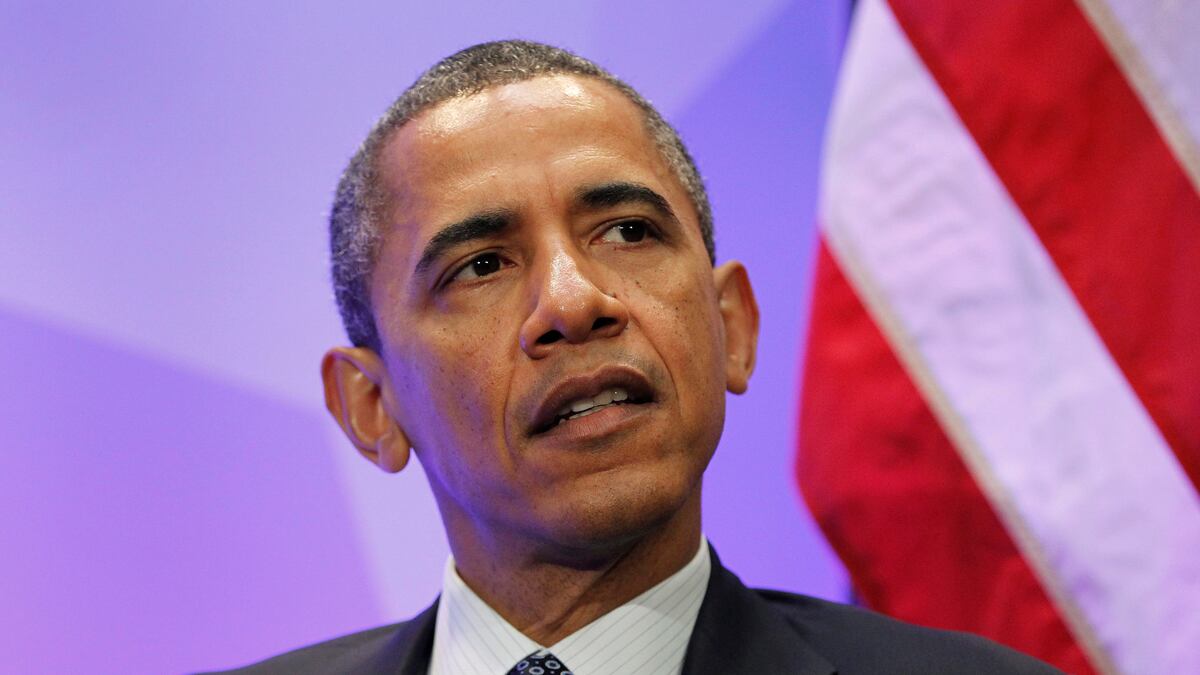There’s a feel-good myth that governs much American punditry: that good policy and good politics go hand in hand. Often, sadly, it’s not true. Take President Obama and Afghanistan: On no other major issue has Obama been so cynical. And on no other issue has his cynicism proved so politically shrewd.
This week in Chicago, Obama will announce the withdrawal of U.S. combat troops from Afghanistan by next summer. He will, in effect, be conceding defeat: the Taliban remains strong; the Hamid Karzai government looks inept and corrupt; the country appears headed for civil war. Al Qaeda may be weaker than it was three years ago, but not because of America’s wildly expensive counterinsurgency effort, which has proved a massive bust.
Historically, Democrats who “lose countries”—think Harry Truman “losing” China or Jimmy Carter “losing Iran”—have paid a huge political price. Yet Obama is “losing” Afghanistan without paying any price at all. Mitt Romney is virtually mute on the issue. He can’t attack Obama for having surrendered, because even most Republicans are sick of the Afghan war. Moreover, Americans actually trust Obama on national security, a remarkable accomplishment for a liberal Democrat with no military background. According to a recent poll by George Washington University and Politico, Obama leads Romney on foreign policy by 13 points.
How did Obama pull off this political equivalent of a triple axel? Part of the answer, of course, is that he killed Osama bin Laden, thus satiating the primal hunger that led America into the Hindu Kush in the first place. But that happened only last May. Even before Obama killed Osama, a majority of Americans already approved of his foreign policy, according to a February 2011 Los Angeles Times poll. The other reason Obama has navigated the politics of Afghanistan so successfully is that back in 2009 he sent 30,000 more troops there. He’s benefiting, in other words, from having done the wrong thing.
In the 2008 presidential campaign, Obama had pledged to focus on the “good war” that George W. Bush neglected because of his obsession with Iraq. When he entered the White House, the leadership of the U.S. military was waiting with an answer: an open-ended, blank-check counterinsurgency strategy that resembled the “surge” they had pursued, with ostensible success, in Iraq.

Obama looked at the price tag and the situation on the ground—which was far worse than the Bush administration had let on—and balked. But the military brass, led by the hero of Iraq, Gen. David Petraeus, moved aggressively to box Obama in. According to Bob Woodward’s book Obama’s Wars, Obama mused wistfully about sending a mere 10,000 new trainers to Afghanistan before ditching the idea after being reminded that doing so might prompt Defense Secretary Robert Gates to resign. Similarly, in David Sanger’s new book, Confront and Conceal—excerpted in this Sunday’s New York Times—an Obama adviser comments, “I think he hated the idea [of the surge] from the beginning ... The military was ‘all in,’ as they say, and Obama wasn’t.”
Obama whittled down the military’s request to 30,000 troops and insisted that the U.S. begin withdrawing them after 18 months. But in policy terms, the compromise made no sense. If, as Obama rightly suspected, the situation in Afghanistan was so hopeless that a multiyear, multibillion-dollar surge could not stabilize Karzai’s government, it was even nuttier to believe the U.S. could do so in a mere 18 months. The Obama administration said it was lowering America’s goal: seeking not to defeat the Taliban, but merely to soften them up for the negotiations that would produce a political settlement. Left unexplained was why the Taliban would cut a deal with the Karzai government when it could simply wait out the surge.
As policy, Obama’s surge was a mess. But politically, it worked wonders. Had Obama opposed any surge back in 2009, when the public—and the GOP—had far more stomach for war than they do now, the political consequences might have been brutal. Petraeus could have publicly objected—or even resigned—thus giving congressional Republicans their latter-day Douglas MacArthur, a heroic general denied his shot at victory by a pusillanimous president. Even if the military brass had kept quiet, Obama would have begun his administration by essentially admitting defeat in a war to which he had spent the entire campaign committing himself. Fox News would have had a field day.
Instead, Obama kicked the can down the road, delaying the public admission of defeat until now, by which point America’s failure is so obvious that barely anyone bothers to object. Essentially, he played rope-a-dope, giving Petraeus & Co. the chance to prove what one suspects Obama already believed: that counterinsurgency in Afghanistan had no chance.
Finally, a Democrat who knows how to play the politics of national security and win. But political victories can carry a human price. According to iCasualties, more than 1,300 Americans have died in Afghanistan since Obama took office, more than twice the number that died under George W. Bush. And since it is highly unlikely that Afghanistan’s future will be significantly different because America withdrew its combat troops in 2013 instead of 2009, one can reasonably ask: what did the United States accomplish during those four years that can possibly justify their deaths? It’s disturbing that Barack Obama doesn’t have a good answer to that question. It’s even more disturbing that politically, he doesn’t need one.





